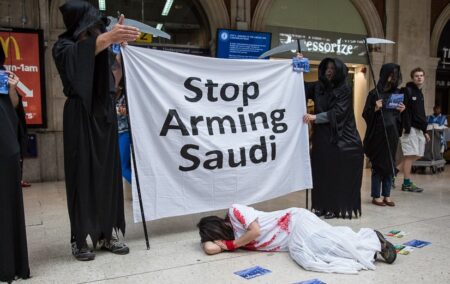FIFA’s recent announcement crowning Saudi Arabia as the host for the 2034 Men’s World Cup hardly came as a shock.
After all, the Middle East, being the centre of the universe for some, is the obvious choice for the world’s greatest sporting spectacle. And with FIFA’s impeccable reputation for transparency and integrity, who would possibly raise an eyebrow?
As for the 2026 World Cup, it will generously be shared across Canada, the United States, and Mexico − a mere three countries. But FIFA wasn’t done pushing boundaries: the 2030 tournament will leap even further, spanning not just three nations but two entire continents − Spain, Portugal, and Morocco. Truly, no effort is too great for the sake of “the beautiful game”.
Sports, a global unifier, has recently become a platform for “sports-washing,” where nations use sports to enhance their international image while masking human rights issues. Who would accuse Saudi Arabia and Qatar of exploiting their vast oil wealth in exemplifying this trend, utilising high-profile sports to “buy” global influence?
Qatar’s 2022 FIFA Men’s World Cup attracted much criticism for its human rights record, including mistreatment of migrant workers, LGBTQ+ restrictions, and suppressed dissent. Saudi Arabia’s human rights record is equally contentious.
Decapitation with a sword
On 4 April 2022, 81 people were executed in Saudi Arabia in a single day by decapitation with a sword. According to Human Rights Watch, the majority of these individuals were tortured to obtain confessions.
Women’s rights have seen some reforms, such as the lifting of the driving ban, but gender equality remains far from realised. LGBTQ+ individuals face severe persecution, and political dissidents are routinely jailed or silenced. Would it surprise anyone if Qatar or Saudi Arabia were to win a bid to host the Olympic Games in the not too distant future? Watch that space.
Hosting global sports events serves as a strategy for these nations to project modernity and openness. Saudi Arabia has heavily invested in Formula 1, boxing, tennis and golf through its Public Investment Fund (PIF), while Qatar owns Paris Saint-Germain (PSG) and sponsors major events like the IAAF World Athletics Championships.
International sporting events serve to divert attention from domestic controversies, reducing the hosts’ reliance on oil and offering the scope to wield “soft” power in global sports governance.
Beyond mere sports-washing, Saudi Arabia and Qatar have also managed to embed themselves deeply within Western academia. Universities in the US, UK and Europe have eagerly accepted billions in funding, conveniently labelled as partnerships to promote research and mutual understanding. Of course, such generosity occasionally sparks pesky ethical questions − like whether this financial windfall might subtly discourage criticism of human rights abuses or quietly influence the appointment of academic chairs. But who’s counting?
Ethical dilemmas
Sports-washing, unsurprisingly, raises some thorny ethical dilemmas.
By cosying up to these regimes, international organisations, universities, and cultural institutions risk not just normalising human rights violations but becoming complicit in them.
One might think transparency, accountability, and principled decision-making would take precedence, but, hey, money talks.
[Image: https://www.flickr.com/photos/campaignagainstarmstrade/27649320274/in/photostream/]
The views of the writer are not necessarily the views of the Daily Friend or the IRR.
If you like what you have just read, support the Daily Friend

